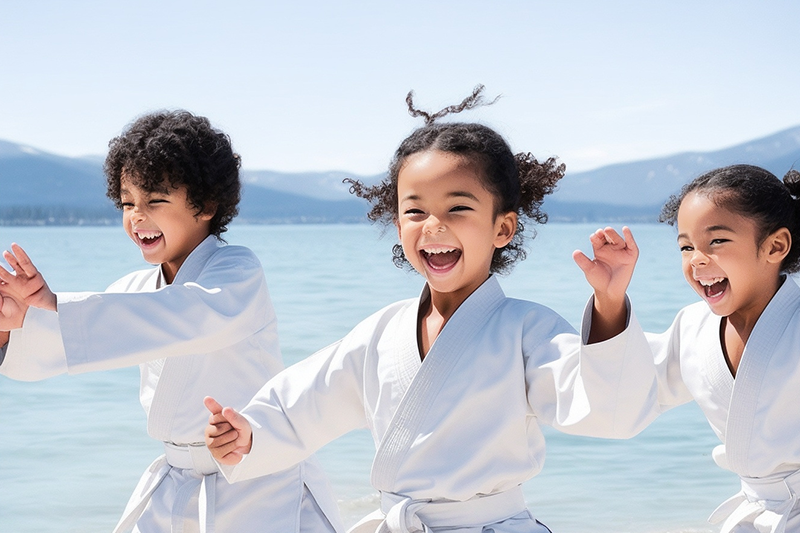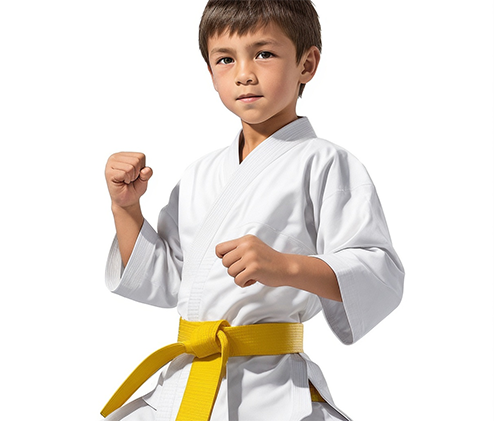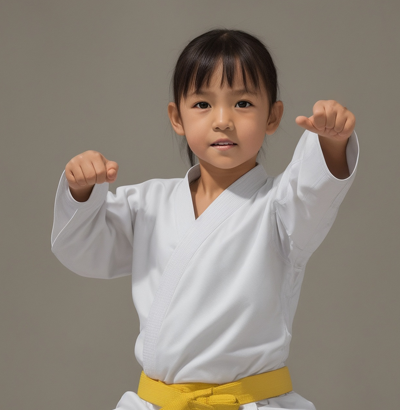More Than Kicks
Building Character Through Martial Arts
Unleashing the Power of Play and Values in Your Child’s Life. Join us on a journey where every kick is a step towards confidence, friendship, and growth.

Not ready to secure your child’s spot in our unique program? Our classes go beyond martial arts to shape character and lifelong skills. Want to learn more? Contact us now, or keep scrolling to find out more!

Building Character through Martial Arts

Classes & Private Lessons
Contact us today to find out what we have to offer.
Before you embark on this journey, let’s acknowledge something important. Martial arts isn’t a one-size-fits-all path. Not every student will walk away with a black belt around their waist. But that’s not the point. Martial arts might serve as a springboard to uncover a child’s confidence or to unearth their hidden passions and talents. It might stand as a guardian for teenagers, protecting them from violent encounters. And for some adults, it’s about basic fitness and the camaraderie that keeps spirits high. I understand and respect this diversity in purpose. I hope your respect that I am as unwavering in my belief in each of your journeys as I am in the power of martial arts.
Peter Rulon-Miller, Sole Instructor & Owner
Our Classes
Enrichment Programs
Check our directory for participating schools. Want to bring our program to your preschool? Reach out to us!
Classes at our Incline Village Studio
Kickstart your child’s martial arts journey with our introductory program. Experience our evolving, intensive sessions starting January 1, 2024.
Private Lessons
Dive deeper into martial arts with private lessons tailored just for you. Limited slots available.


TESTIMONIALS
What parents and instructors have to say about Peter Rulon-Miller as a teacher:
The following are testimonials from parents and colleagues speaking to how Peter’s commitment to the intention of authentic Martial Arts has translated to instruction on the floor:
Mr. RM has been a positive influence on our son. We have seen him grow and be proud of something he’s truly good at. Mr. RM gave him confidence. His training is unique and fun but still gives the kids all the fundamentals they need to succeed. We can genuinely see a difference between the way he teaches and the way others do. Thank you, Mr. RM, for everything you did for us and our son!
-Saira
Mr RM has been a fantastic teacher and mentor for my son. I’ve seen my son’s hand eye coordination, balance and discipline grow and improve under Mr RM’s instruction.
-Kevin
Mr. RM is exceptional at teaching. I can not say enough good things about his instruction. My son is 4 years old and was new to Martial Arts. He loved going to class because of Mr. RM. He makes the kids laugh and has fun during class, gains instructional control & follows through throughout class. During classes, Mr. RM has taught our son about control, focus, respect, confidence, & public speaking. I highly recommend Mr. RM’s classes/instruction.
-Celina
Peter R-M has a gift. I saw him teach a class this evening with 9 elementary school boys, and he held their attention and respect throughout the hour in such a lovely way. He was charismatic and fun, but all with an undertone of discipline. His instruction was clear, and the mix of basics, challenges, drills and games felt thoughtful and intentional. If a child was momentarily disruptive, Mr. R-M provided an immediate but respectful correction. When I asked my very active 7 year old how he felt after class, he said “Calm. You said we can go back Saturday. How many days away is that?” Enough said.
-Valerie
I seldom write reviews, but feel compelled to write this one to honor the excellent work of the instructor Peter Rulon-Miller… You can tell he is putting his heart and effort in each class. He is good with kids and knows how to engage them. The class is upbeat and fun on top of learning good skills and character building. I myself even enjoy watching the class. My son loves the class so much.
-Winsy
Peter Rulon-Miller a is a devout lifetime martial artist and has spent extensive time training studying and teaching the knowledge he has obtained. His Martial Arts is unique in the fact that he constantly strives to improve his understanding seeking top notch instruction and thoroughly honing the skills taught to him to near perfection. Peter started training in various Martial Arts as a young child. His hard work and passion has always helped him stand out from his peers. His understanding of the importance of developing a strong body mind and spirit transfers over when Peter is working to develop the youth. He is patient with all of his students and carries a high standard of expectation in building anyone under his tutelage- his instruction is clear, direct, and digestible so it is easy to understand and he has a way of making the learning process fun and enjoyable!!
-Hans Wikkeling, 5th Degree Black Belt, USA Martial Arts
Mr. RM has been truly an inspiration to both my son and daughter. He is always able to pull their attention back to him in such a positive way (trust me, I am impressed with how well my daughter listens to him)!! My kids have worked with Mr. RM in 2 other Academies over the last few years and we are so honored to be joining him in his very own Academy… My kids love learning karate with him and thrive to go as many days a week as they can! I have also noticed a huge positive impact on the way my kids show respect not only in the Academy but at home and other public places. They have definitely changed in a more positive way since working with Mr. RM and I notice such a difference in my son’s self-esteem! My son feels confident and actually pushes himself to get better with not only his karate but in everything he does in life! Thank you Peter for being such a positive influence on my children while teaching them Karate, self-discipline, and respect! You are truly amazing and I am blessed that my children get to continue learning from you!
-Rochelle
We are so lucky to be a part of this academy. Mr. R-M brings out the best in my boys and is a great example of discipline and leadership. Not only are they learning skills in karate but skills that will prepare them to be successful in life.
-Rachel
Lake Tahoe Karate: The Programs
Martial arts for real people, at every age.
Grounded in tradition. Informed by modern research. Focused on character, competence, and autonomy. Lake Tahoe Karate is not a fitness trend or a fight gym.
It is a disciplined learning environment where students develop real self-defense skills, emotional maturity, and a deeper relationship to their own bodies and choices.
Age-Appropriate by Design
Every class is built around how people actually learn and grow.
-
Ages 4–5
Simple structure, clear boundaries, play with purpose. Learning how to listen, move, and care for themselves and others. -
Ages 6–8
Skill foundations, cooperation, cause-and-effect. Building confidence through achievable challenges. -
Ages 9–12
Increased responsibility, problem-solving, and self-control. Students begin to understand consequences and personal effort. -
Ages 13–18
Identity, resilience, and critical thinking. Training becomes a space to test oneself, refine judgment, and build self-respect. -
Adults
Serious training without ego. Technical instruction, mutual respect, and steady personal development in a mature environment.
Each group trains differently—without shortcuts, without pretending children are adults, and without talking down to anyone.
What We Teach
Karate is the foundation.
Everything else supports it.
-
Traditional Karate
Kata (forms), kihon (fundamentals), partner work, and time-tested standards of excellence. -
Jiu-Jitsu & Breakfalls
Practical grappling awareness, control, and safe falling skills. -
Boxing & Kickboxing
Timing, footwork, distance, and striking mechanics—taught with control and clarity. -
Modern Self-Defense
Awareness, avoidance, de-escalation, and realistic responses to genuine threats. -
Verbal & Social Skills
Clear communication, boundary-setting, and the ability to stand up for oneself without unnecessary conflict.
This is not about collecting techniques.
It is about learning how to think, move, and respond under pressure.
The Space
Our dojo is intentionally calm, clean, and focused.
It is not a gym. It is not school. It is not chaotic.
Rituals like bowing and cleaning are not symbolic fluff—they teach care, attention, and respect for shared space. Students learn that how they show up matters.
Why Martial Arts
Self-defense matters—but it is not the whole story.
Martial arts work because they are embodied.
Learning happens through the body, through effort, through challenge, and through feedback that cannot be faked.
Students don’t just hear ideas—they experience them.
Over time, they learn:
-
Awareness of themselves and their surroundings
-
Emotional regulation under stress
-
Responsibility for their actions
-
Confidence rooted in competence
-
Respect for others without submission or aggression
The deeper aim is authentic autonomy—the ability to stand on one’s own feet, make good decisions, and protect what matters.
The Instructor
Peter Rulon-Miller
Founder & Head Instructor
I began training at age nine and teaching by thirteen.
Martial arts became the place where learning stopped being abstract and became personal.
Over decades of practice and study—in education, psychology, philosophy, and embodied learning—I’ve seen how powerful authentic martial arts can be when taught with care and seriousness.
This school exists because I believe young people, especially, need environments that demand responsibility without crushing curiosity, and discipline without domination.
Not everyone will train forever.
But everyone should leave stronger, clearer, and more grounded than when they arrived.
A Note to Parents & Students
This is not a program built on hype, belts, or quick confidence boosts.
Progress here is real, earned, and personal.
If you’re looking for:
-
A place that respects children as developing human beings
-
Training that values character as much as skill
-
A teacher who cares deeply about how martial arts shape lives
You’re welcome here.
Opening Hours
Please call for an appointment!
Monday- Thursday
3:00 PM - 9:30 PM
Saturday
8:00 AM- 3:00 PM
Sunday
8:00 AM- 12:30 PM
Phone
(775) 835-2154
Address
930 Tahoe Blvd., Suite 201
Incline Village, NV 89451
